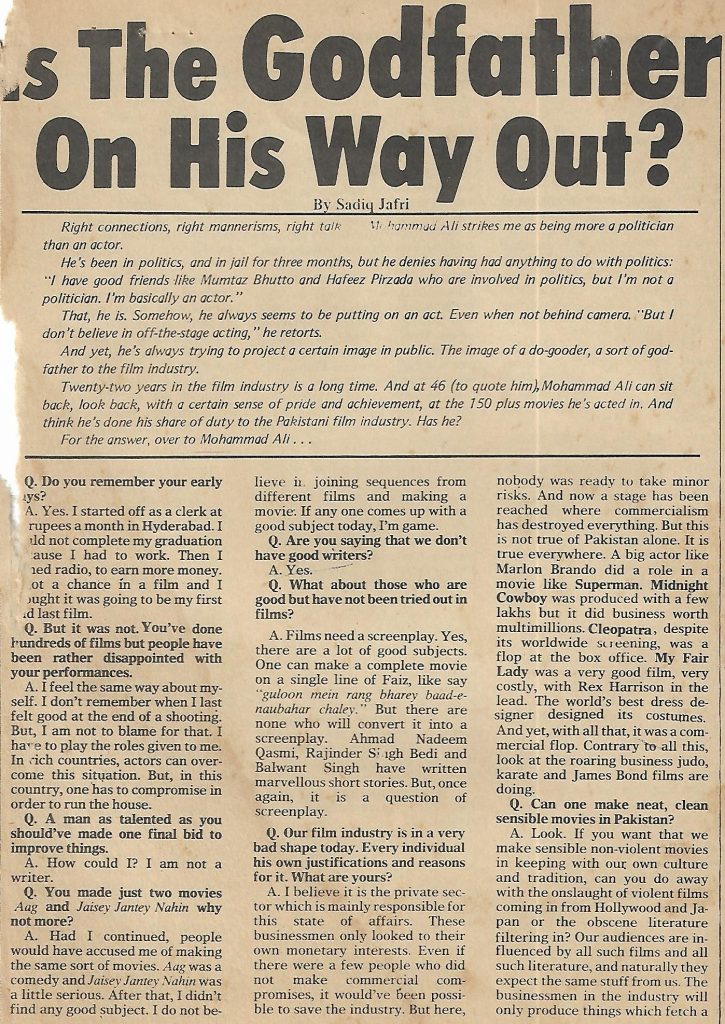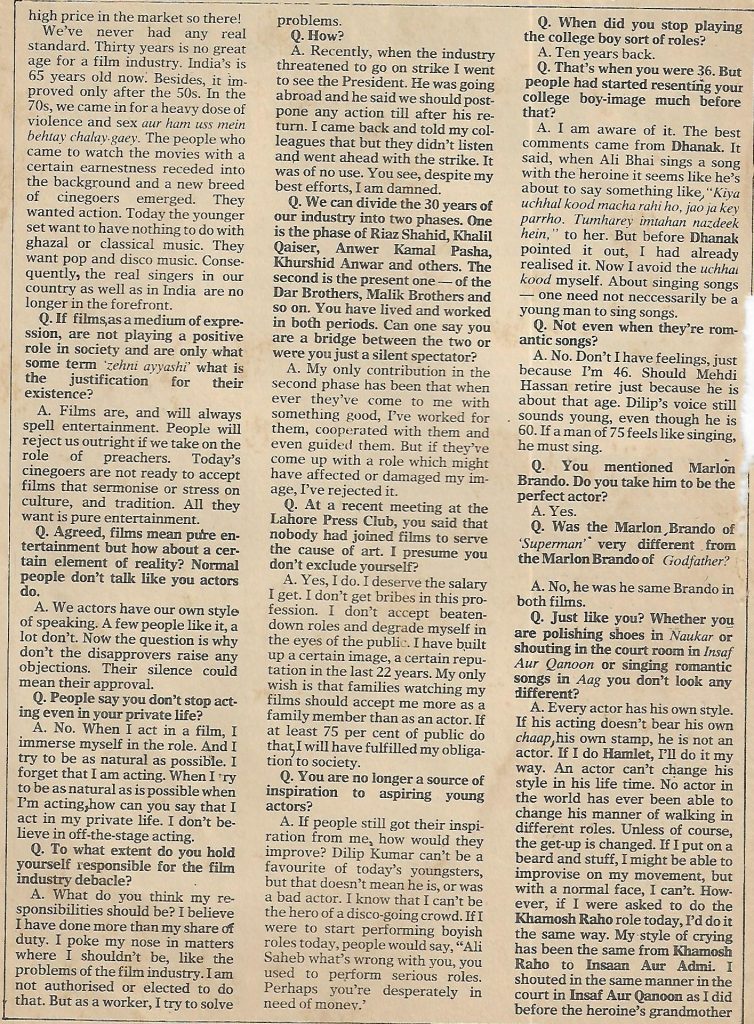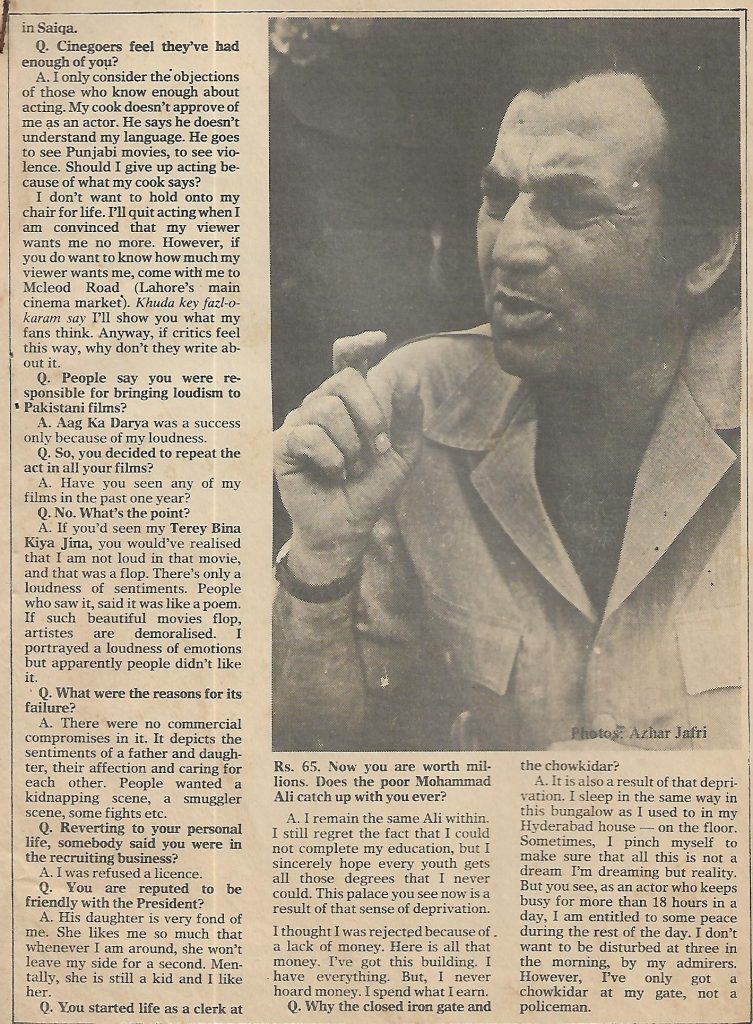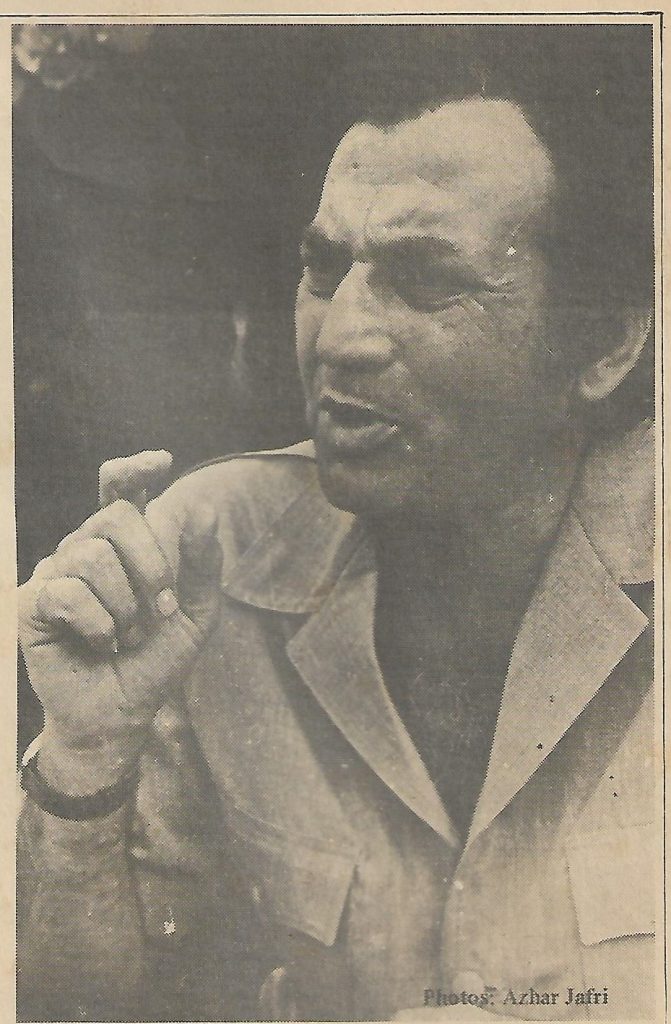The Herald
October, 1983
By Sadiq Jafri

“Don’t I have feelings, just because I’m 46. Should Mehdi Hassan retire just because he is about that age. Dilip’s voice still sounds young, even though he is 60. If a man of 75 feels like singing, he must sing.”
“My cook doesn’t approve of me as an actor. He says he doesn’t understand my language. He goes to see Punjabi movies, for violence. Should I give up acting because of what my cook says?”
Right connections, right mannerisms, and right talk with Muhammad Ali strikes me as being more a politician than an actor.
He is been in politics, and in jail for three months, but he denies having had anything to do with politics: “I have good friends like Mumtaz Bhutto and Hafeez Pirzada who are involved in politics, but I’m not a politician, I’m basically an actor.”
That, he is. Somehow, he always seems to be putting on an act. Even when not behind camera. “But I don’t believe in off-the-stage acting,” he retorts.
And yet, he is always trying to project a certain image in public. The image of a do-gooder, a sort of Godfather to the film industry.
Twenty-two years in the film industry is a long time. And at 46 (to quote him), Mohammad Ali can sit back, look back, with a certain sense of pride and achievement, at the 150-plus movies he’s acted in. And think he’s done his share of duty to the Pakistani film industry. Has he?
For the answer, over to Mohammad Ali…
Q. Do you remember your early days?
A. Yes. I started off as a clerk at rupees a month in Hyderabad. I could not complete my graduation because I had to work. Then I joined radio, to earn more money. I got a chance in a film and I thought it was going to be my first and last film.
Q. But it was not. You’ve done Hundreds of films but people have been rather disappointed with your performances.
A. I feel the same way about myself. I don’t remember when I last felt good at the end of a shooting. But I am not to blame for that. I have to play the roles given to me. In rich countries, actors can overcome this situation. But, in this country, one has to compromise in order to run the house.
Q. A man as talented as you should’ve made one final bid to improve things.



A. How could I? I am not a writer.
Q. You made just two movies Aag and Jaisey Jantey Nahin why not more?
A. Had I continued, people would have accused me of making the same sort of movies. Aag was a comedy and Jaisey Jantey Nahin was a little serious. After that, I didn’t find any good subject. I do not believe in joining sequences from different films and making a movie. If anyone comes up with a good subject today, I’m game.
Q. Are you saying that we don’t have good writers?
A. Yes.
Q. What about those who are good but have not been tried out in films?
A. Films need a screenplay. Yes, there are a lot of good subjects. One can make a complete movie on a single line of Faiz, like say “guloon mein rang bharey baad-e naubahar chaley.” But there are none who will convert it into a screenplay. Ahmad Nadeem Qasmi, Rajinder Singh Bedi and Balwant Singh have written marvelous short stories. But, once again, it is a question of screenplay.
Q. Our film industry is in a very bad shape today. Every individual his own justifications and reasons for it. What are yours?
A. I believe it is the private sector which is mainly responsible for this state of affairs. These businessmen only looked to their own monetary interests. Even if there were a few people who did not make commercial compromises, it would’ve been possible to save the industry. But here, nobody was ready to take minor risks. And now a stage has been reached where commercialism has destroyed everything. But this is not true of Pakistan alone. It is true everywhere. A big actor like Marlon Brando did a role in a movie like Superman. Midnight Cowboy was produced with a few lakhs but it did business worth multimillions. Cleopatra, despite its worldwide screening was a flop at the box office. My Fair Lady was a very good film, very costly, with Rex Harrison in the lead. The world’s best dress designer designed its costumes. And yet, with all that, it was a commercial flop. Contrary to all this, look at the roaring business judo, karate and James Bond films are doing.
Q. Can one make neat, clean sensible movies in Pakistan?
A. Look. If you want that we make sensible non-violent movies in keeping with our own culture and tradition, can you do away with the onslaught of violent films coming in from Hollywood and Japan or the obscene literature filtering in? Our audiences are influenced by all such films and all such literature, and naturally they expect the same stuff from us. The businessmen in the industry will only produce things which fetch a high price in the market so there!
We’ve never had any real standard. Thirty years is no great age for a film industry. India’s is 65 years old now. Besides, it improved only after the 50s. In the 70s, we came in for a heavy dose of violence and sex aur ham uss mein behtay chalay gaey. The people who came to watch the movies with a certain earnestness receded into the background and a new breed of cinegoers emerged. They wanted action. Today the younger set want to have nothing to do with ghazal or classical music. They want pop and disco music. Consequently, the real singers in our country as well as in India are no longer in the forefront.
Q. If films as a medium of expression, are not playing a positive role in society and are only what some term ‘zehni ayyashi’ what is the justification for their existence?
A. Films are, and will always spell entertainment. People will reject us outright if we take on the role of preachers. Today’s cinegoers are not ready to accept films that sermonize or stress on culture, and tradition. All they want is pure entertainment.
Q. Agreed, films mean pure entertainment but how about a certain element of reality? Normal people don’t talk like you actors do.
A. We actors have our own style of speaking. A few people like it, a lot don’t. Now the question is why don’t the disapprovers raise any objections. Their silence could mean their approval.
Q. People say you don’t stop acting even in your private life?
A. No. When I act in a film, I immerse myself in the role. And I try to be as natural as possible. I forget that I am acting. When I try to be as natural as is possible when I’m acting, how can you say that I act in my private life. I don’t believe in off-the-stage acting.
Q. To what extent do you hold yourself responsible for the film industry debacle?
A. What do you think my responsibilities should be? I believe I have done more than my share of duty. I poke my nose in matters where I shouldn’t be, like the problems of the film industry. I am not authorized or elected to do that. But as a worker, I try to solve problems.
Q. How?
A. Recently, when the industry threatened to go on strike, I went to see the President. He was going abroad and he said we should postpone any action till after his return. I came back and told my colleagues that but they didn’t listen and went ahead with the strike. It was of no use. You see, despite my best efforts, I am damned.
Q. We can divide the 30 years of our industry into two phases. One is the phase of Riaz Shahid, Khalil Qaiser, Anwer Kamal Pasha, Khurshid Anwar and others. The second is the present one―of the Dar Brothers, Malik Brothers and so on. You have lived and worked in both periods. Can one say you are a bridge between the two or were you just a silent spectator?
A. My only contribution in the second phase has been that whenever they’ve come to me with something good, I’ve worked for them, cooperated with them and even guided them. But if they’ve come up with a role which might have affected or damaged my image, I’ve rejected it.
Q. At a recent meeting at the Lahore Press Club, you said that nobody had joined films to serve the cause of art. I presume you don’t exclude yourself?
A. Yes, I do. I deserve the salary I get. I don’t get bribes in this profession. I don’t accept beaten down roles and degrade myself in the eyes of the public. I have built up a certain image, a certain reputation in the last 22 years. My only wish is that families watching my films should accept me more as a family member than as an actor. If at least 75 percent of public do that I will have fulfilled my obligation to society.
Q. You are no longer a source of inspiration to aspiring young actors?
A. If people still got their inspiration from me, how would they improve? Dilip Kumar can’t be a favorite of today’s youngsters, but that doesn’t mean he is, or was a bad actor. I know that I can’t be the hero of a disco-going crowd. If I were to start performing boyish roles today, people would say, “Ali Saheb what’s wrong with you, you used to perform serious roles. Perhaps you’re desperately in need of money.”
Q. When did you stop playing the college boy sort of roles?
A. Ten years back.
Q. That’s when you were 36. But people had started resenting your college boy image much before that?
A. I am aware of it. The best comments came from Dhanak. It said, when Ali Bhai sings a song with the heroine it seems like he’s about to say something like, “Kiyu uchhal kood macha rahi ho, jao jakey parro. Tumharey imtahan nazdeek hein,” to her. But before Dhanak pointed it out, I had already realized it. Now I avoid the uchhal kood myself. About singing songs―one need not necessarily be a young man to sing songs.
Q. Not even when they’re romantic songs?
A. No. Don’t I have feelings, just because I’m 46. Should Mehdi Hassan retire just because he is about that age. Dilip’s voice still sounds young, even though he is 60. If a man of 75 feels like singing, he must sing.
Q. You mentioned Marlon Brando. Do you take him to be the perfect actor?
A. Yes.
Q. Was the Marlon Brando of ‘Superman’ very different from the Marlon Brando of Godfather?
A. No, he was the same Brando in both films.
Q. Just like you? Whether you are polishing shoes in Naukar or shouting in the court room in Insaf Aur Qanoon or singing romantic songs in Aag you don’t look any different?
A. Every actor has his own style. If his acting doesn’t bear his own chaap, his own stamp, he is not an actor. If I do Hamlet, I’ll do it my way. An actor can’t change his style in his life time. No actor in the world has ever been able to change his manner of walking in different roles. Unless of course, the get-up is changed. If I put on a beard and stuff, I might be able to improvise on my movement, but with a normal face, I can’t. However, if I were asked to do the Khamosh Raho role today, I’d do it the same way. My style of crying has been the same from Khamosh Raho to Insaan Aur Admi. I shouted in the same manner in the court in Insaf Aur Qanoon as I did before the heroine’s grandmother in Saiqa.
Q. Cinegoers feel they’ve had enough of you?
A. I only consider the objections of those who know enough about acting. My cook doesn’t approve of me as an actor. He says he doesn’t understand my language. He goes to see Punjabi movies, to see violence. Should I give up acting because of what my cook says?
I don’t want to hold onto my chair for life. I’ll quit acting when I am convinced that my viewer wants me no more. However, if you do want to know how much my viewer wants me, come with me to Mcleod Road (Lahore’s main cinema market). Khuda key fazl-o-karam say I’ll show you what my fans think. Anyway, if critics feel this way, why don’t they write about it.
Q. People say you were responsible for bringing loudism to Pakistani films?
A. Aag ka Darya was a success only because of my loudness.
Q. So, you decided to repeat the act in all your films?
A. Have you seen any of my films in the past one year?
Q. No. What’s the point?
A. If you’d seen my Terey Bina Kiya Jina, you would’ve realized that I am not loud in that movie, and that was a flop. There’s only a loudness of sentiments. People who saw it, said it was like a poem. If such beautiful movies flop, artistes are demoralized. I portrayed a loudness of emotions but apparently people didn’t like it.
Q. What were the reasons for its failure?
A. There were no commercial compromises in it. It depicts the sentiments of a father and daughter, their affection and caring for each other. People wanted a kidnapping scene, a smuggler scene, some fights etc.

Q. Reverting to your personal life, somebody said you were in the recruiting business?
A. I was refused a license.
Q. You are reputed to be friendly with the President?
A. His daughter is very fond of me. She likes me so much that whenever I am around, she won’t leave my side for a second. Mentally, she is still a kid and I like her.
Q. You started life as a clerk at Rs. 65. Now you are worth millions. Does the poor Mohammad Ali catch up with you ever?
A. I remain the same Ali within. I still regret the fact that I could not complete my education, but I sincerely hope every youth gets all those degrees that I never could. This palace you see now is a result of that sense of deprivation.
I thought I was rejected because of a lack of money. Here is all that money. I’ve got this building. I have everything. But I never hoard money. I spend what I earn.
Q. Why the closed iron gate and the chowkidar?
A. It is also a result of that deprivation. I sleep in the same way in this bungalow as I used to in my Hyderabad house―on the floor. Sometimes, I pinch myself to make sure that all this is not a dream I’m dreaming but reality. But you see, as an actor who keeps busy for more than 18 hours in a day, I am entitled to some peace during the rest of the day. I don’t want to be disturbed at three in the morning, by my admirers. However, I’ve only got a chowkidar at my gate, not a policeman.